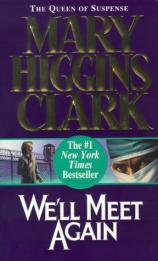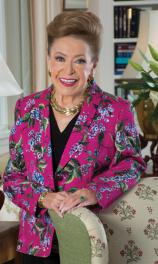Excerpt
Excerpt
We'll Meet Again

Chapter 1
Gus Brandt, executive producer for the NAF Cable Network, looked up from his desk at 30 Rockefeller Plaza in Manhattan. Fran Simmons, whom he'd recently hired as an investigative reporter for the six o'clock news hour and for regular assignments to his hot new True Crime program, had just entered his office.
"The word's in," he said excitedly. "Molly Carpenter Lasch is being paroled from prison. She gets out next week."
"She did get parole!" Fran exclaimed. "I'm so glad."
"I wasn't sure you'd remember the case. You were living in California six years ago. Do you know much about it?"
"Everything, actually. Don't forget, I went to Cranden Academy in Greenwich, with Molly. I had the local papers sent to me throughout the trial."
"You went to school with her? That's great. I want to schedule a full background story on her for the series as soon as possible."
"Sure. But Gus, don't think I have an inside track with Molly," Fran warned. "I haven't laid eyes on her since the summer we graduated, and that was fourteen years ago. At the same time I began U. Cal, my mother moved to Santa Barbara, and I lost touch with just about everybody in Greenwich."
There'd actually been many reasons for both her and her mother relocating to California, leaving Connecticut as far behind as memory would allow. On the day of Fran's graduation from the academy, her father had taken her and her mother out for a festive dinner of celebration. At the end of the meal he had toasted Fran's future at his alma mater, kissed both of them, and then, saying that he'd left his wallet in the car, he had gone out to the parking lot and shot himself. In the next few days the reason for his suicide became apparent. An investigation quickly determined that he'd embezzled $400,000 from the Greenwich Library Building Fund drive he'd volunteered to chair.
Gus Brandt knew that story already, of course. He'd brought it up when he came to Los Angeles to offer her the job at NAF-TV. "Look, that's in the past. You don't need to hide away out here in California, and besides, coming with us is the right career move for you," he'd said. "Everyone who makes it in this business has to move around. Our six o'clock news hour is beating the local network stations, and the True Crime program is in the top ten in the ratings. Besides, admit it: you've missed New York."
Fran almost had expected him to quote the old chestnut that outside New York it's all Bridgeport, but he hadn't gone that far. With thinning gray hair and sloping shoulders, Gus looked every second of his fifty-five years, and his countenance carried permanently the expression of someone who had just missed the last bus on a snowy night.
The look was deceptive, however, and Fran knew it. In fact, he had a razor-sharp mind, a proven track record for creating new shows, and a competitive streak second to none in the industry. With hardly a second thought, she'd taken the job. Working for Gus meant being on the fast track.
"You never saw or heard from Molly after you graduated?" he asked.
"Nope. I wrote her at the time of the trial, offering my sympathy and support, and got a form letter from her lawyer saying that while she appreciated my concern, she would not be corresponding with anyone. That was over five and a half years ago."
"What was she like? When she was young, I mean."
Fran tucked a strand of light brown hair behind her ear, an unconscious gesture that was an indication she was concentrating. An image flashed through her mind, and for an instant she could see Molly as she'd been at age sixteen, at Cranden Academy. "Molly was always special," she said after a moment. "You've seen her pictures. She was always a beauty. Even when the rest of us were still gawky adolescents, she was already turning heads. She had the most incredible blue eyes, almost iridescent, plus a complexion models would kill for and shimmering blond hair. But what really impressed me was that she was always so composed. I remember thinking if she met the pope and the queen of England at the same party, she'd know how to address them and in what order. And yet, the funny part was that I always suspected that, inside, she was shy. Despite her remarkable composure, there was something tentative about her. Kind of like a beautiful bird perched at the end of a branch, poised but ready at any second to take flight."
She'd glide across the room, Fran thought, remembering seeing her once in an elegant gown. She looked even taller than five eight because she had such gorgeous carriage.
"How friendly were you two?" Gus queried.
"Oh, I wasn't really in her orbit. Molly was part of the moneyed country club set. I was a good athlete and concentrated on sports more than on social activities. I can assure you my phone was never ringing off the hook on Friday night."
"As my mother would have put it, you grew up nice," Gus said dryly.
I was never at ease at the academy, Fran thought. There are plenty of middle-class families in Greenwich, but middle class wasn't good enough for Dad. He was always trying to ingratiate himself with wealthy people. He wanted me to be friends with the girls who came from money or who had family connections.
"Apart from her appearance, what was Molly like?"
"She was very sweet," Fran said. "When my father died and the news came out about what he had done --- the embezzling and the suicide and everything --- I was avoiding everyone. Molly knew I jogged every day, and early one morning she was waiting for me. She said she just wanted to keep me company for a while. Since her father had been one of the biggest donors to the library fund, you can imagine what her show of friendship meant to me."
"You had no reason to be ashamed because of what your father did," Gus snapped.
Fran's tone became crisp. "I wasn't ashamed of him. I was just so sorry for him -- and angry too, I guess. Why did he think that my mother and I needed things? After he died, we realized how frantic he must have been in the days just before, because they were about to audit the library fund's books, and he knew he'd be found out." She paused, then added softly, "He was wrong to have done all that, of course. Wrong to have taken the money and wrong to think we needed it. He was weak also. I realize now he was terribly insecure. But at the same time, he was an awfully nice guy."
"So was Dr. Gary Lasch. He was a good administrator too. Lasch Hospital has a top-drawer reputation, and Remington Health Management isn't like so many of the cockamamie HMOs that are going bankrupt and leaving patients and doctors high and dry." Gus smiled briefly. "You knew Molly and you went to school with her, so that gives you some insight. Do you think she did it?"
"There's no question that she did it," Fran said promptly. "The evidence against her was overwhelming, and I've covered enough murder trials to understand that very unlikely people ruin their lives by losing control for that one split second. Still, unless Molly changed dramatically after the time I knew her, she'd be the last person in the world I would have said was likely to kill someone. But for that very reason, I can understand why she might have blocked it out."
"That's why this case is great for the program," Gus said. "Get on it. When Molly Lasch gets out of Niantic Prison next week, I want you to be part of the reception committee welcoming her."
Copyright (c) 1999 by Mary Higgins Clark. All rights reserved, including the right of reproduction in whole or in part in any form.




